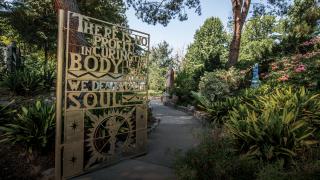Phase I trial of ipatasertib in combination with chemo- and immunotherapy options
Although metastatic triple-negative breast cancer (TNBC) makes up a minority of breast cancer cases (15-20%), it is one of the most aggressive breast cancer subtypes and is notoriously challenging to treat. The fast-growing cancer has a poor survival rate, roughly around 13 months, and a high rate of recurrence. Yuan Yuan, M.D., Ph.D., associate clinical professor, Department of Medical Oncology & Therapeutics Research, is working to improve these outcomes. In a phase 1 trial, Yuan is investigating the best dose of AKT inhibitor ipatasertib in combination with chemo- or immunotherapy drugs for the treatment of patients with Stage 4 TNBC. Her findings may lead to a new treatment modality and new hope for patients.
Part of the difficulty in treating TNBC stems from the lack of three receptors that are traditional treatment targets — estrogen, progesterone and human epidermal growth factor (HER2) receptors. Until this spring, the only Food and Drug Administration-approved treatment for TNBC was chemotherapy; however, with frequent occurrences of chemoresistance, this option has limitations that further underscore the need for additional treatments.
Ipatasertib works by binding to and inhibiting protein kinase AKT, also known as protein kinase B. This protein plays a role in the most common driver pathway of TNBC, the PI3K/AKT/mTOR signaling pathway. The pathway regulates cellular processes, including metabolism, growth, proliferation and survival, but genetic mutations and overexpression that occur during TNBC contribute to unfettered cell growth as well as treatment resistance. With this target, ipatasertib may block tumor growth and proliferation, which is why determining the efficacy at different dosages and any synergistic effects when given in combination with other therapies holds so much promise.
City of Hope is currently enrolling patients in the phase 1 trial (NCT03853707). Potential candidates who meet the following criteria may be eligible:
- 18 years of age and older
- Disease progression during or following treatment with 0-2 lines of chemotherapy and/or biological targeted therapy in the metastatic setting
- Histologically or cytologically confirmed triple-negative breast cancer
- Life expectancy ≥ 3 months

Systematic light exposure may be a novel, low-cost care intervention
Managing the side effects of cancer and cancer treatment is as integral to a patient’s cancer therapy as the cancer treatment itself. Care strategies lead to improvements in quality of life, help people finish treatment successfully and reduce health care costs. Recognizing a current gap in treatment for cancer-related fatigue (CRF), a side effect of both cancer and its treatment that presents as chronic tiredness, Joanne Mortimer, M.D., the Baum Family Professor in Women's Cancers, in collaboration with Mount Sinai Hospital in New York and the National Cancer Institute, is currently investigating the potential of systematic light exposure (sLE) as a treatment for CRF in patients with breast cancer.
Although CRF can be reported up to five years after completion of treatment, it presents at a high prevalence during treatment and deeply impacts patients’ ability to accomplish normal activities associated with daily life. In addition to having evidence suggesting light therapy’s ability to alleviate CRF, the research team was also drawn toward the low-cost, low burden to patients this intervention could provide, unlike other nonpharmacological interventions for CRF that have been previously studied.
The clinical trial hopes to determine if sLE prevents CRF from worsening in breast cancer patients undergoing chemotherapy, explore whether the therapy affects sleep, depression and circadian rhythms, investigate its ability to normalize circadian cortisol rhythms and examine if any effects on fatigue are moderated by sleep, emotional or circadian rhythm factors. Study participants will be administered sLE by light glasses daily throughout their chemotherapy infusions and then assessed both during and after treatment.
If positive, the results of the study could lead to a novel, easily delivered, cost-effective intervention to treat CRF and as a result make the cancer journey much more bearable for patients.
The trial (NCT03217201) is currently recruiting candidates. Eligibility criteria include:
- 18 years of age and older
- Newly diagnosed patients with Stage 1-3a breast cancer scheduled to receive a 12-, 16-, 18-, 20- or 24-week chemotherapy regimen, adjuvant, neoadjuvant or already receiving chemotherapy
- English language proficient
